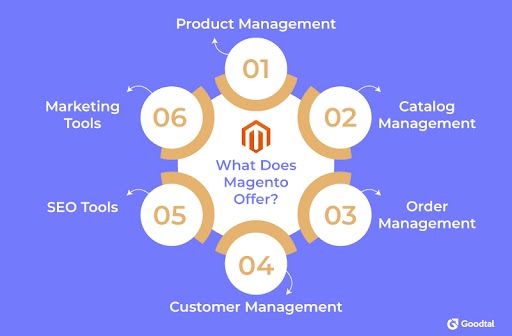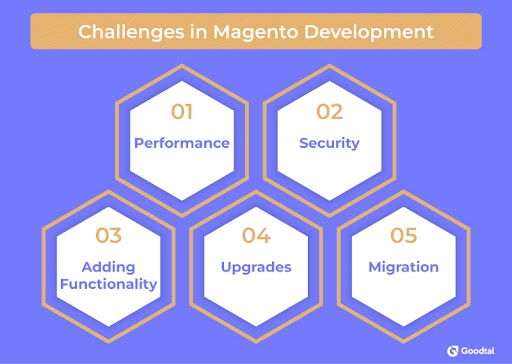
Launched in 2008, Magento is one of the oldest and most experienced open-source e-commerce development platforms. If you are an e-commerce development company, at some stage, you would have explored Magento to find out if it is feasible for your project. Not only the small players, but some of the top e-commerce businesses are using Magento and deriving heavy profits from it.
A quick look at the features will indicate what Magento has to offer to e-commerce businesses. And, the usage statistics of Magento will further convince you why e-commerce businesses cannot ignore it.
Features and Functionality
Magento is an old and experienced e-commerce platform providing most of the common features and functionality to run a successful e-commerce store. Here is a list of common Magento features.

Advantages of Using Magento
Let’s look at the benefits of Magento to e-commerce developers.
Loads of Features
There are various Magento extensions available for almost all major e-commerce requirements. Apart from those mentioned in the above infographic, there are many more features that you can explore. The list cannot be exhaustive though!
Setup and Customization
Magento is not difficult to set up for a professional Magento developer. However, for those who are trying it for the first time, there can be teething troubles, which can resolve with some effort. You can further customize Magento using various tools and extensions. For this, you have the option to choose from a variety of themes, layouts, extensions, etc.
Suggested Reading: Give me 5 minutes! I Will Tell You All the Facts About eCommerce Development
Administration & Management
After the development of the site, e-commerce businesses have to manage product listings, site administration, and transactions with non-technical users. This obviously is not a developer’s task.
Managing an e-commerce store built with Magento is not very difficult with graphical user interface admin tools. When you go for customized e-commerce development, it requires a whole lot of effort to build a backend specifically for non-technical users. However, with Magento, it is available. Generally, this is the main reason why businesses choose open-source platforms that have been built over the years specifically making them more user-friendly and usable entirely without the help of developers or technical staff.
Multi-Store
Magento allows businesses to run multiple stores from a common backend. These stores can be deployed on different domains. It is thus the perfect solution for businesses running e-commerce operations for different brands or different ranges of products that can’t be put on the same e-commerce portal.
Multi-lingual and Multi-Currency Capabilities
As businesses are going global and trying to offer personalized services to their customers from varied demographics, it is necessary to provide multi-language support. Magento is just perfect for this. It helps deliver store services in different languages and different currencies to cater to a wide user base worldwide.
Responsive
All applications need to be responsive as the users are now using varied devices and screen sizes. Magento has come a long way from desktop-friendly generations to mobile responsive versions. It has been tested for different browser configurations. It offers a high-quality user experience that can attract and retain a customer base qualitatively and quantitatively.
SEO Friendly
As such most successful e-commerce businesses hire SEO services to boost their sales. However, the portal must have basic SEO functionality that the service provider can enhance. Magento has evolved through primitive stages of search engine optimization to the era when you can’t have a successful website without SEO. In the present versions, it incorporates SEO functionality so that you don’t have to work hard on it except for the content part.
Community Support
Like most popular open-source CMS or e-commerce platforms, Magento is supported by a huge community of developers and designers worldwide who share their opinions and experiences with each other. Thus, right from installation to troubleshooting, you will have beginner to expert-level help and support who are ready to guide or even do trial-and-error with you even for their own growth.
The official support channel of Magento provides resources and assistance to help you resolve your queries.
Updates
Magento offers regular updates and security patches to keep your site secure and performing. It will obviously depend on you whether you can leverage these benefits or not. However, it is advisable to not use Magento or any other successful open-source platform unless you are prepared to keep up with the updates and implement them as soon as possible.
Technology Stack
Magento technology stack includes many open-source components such as PHP programming language, Apache, Nginx, MySQL, HTML5, CSS3, JQuery, and RequireJS. Many businesses prefer this as all these are commonly available with a lot of community support. However, Magento developers must have hands-on experience with these technologies and must keep themselves updated with the latest versions of all of these for the best results.
Challenges in Magento Development
Many believe that developing using open-source platforms is as simple as a click of your laptop mouse. However, it is not true. No matter how good these platforms are, you will have to work on the setup and configuration. Also, you need to plan the hosting according to the needs of this platform if you want the installation and configuration to be hassle-free and error-free. And there are a lot more challenges in Magento development. We have listed the most common here. Do plan and prepare for these in advance.

Performance
As it is believed for many open-source platforms, Magento also poses performance challenges when the scale of the project is very high in terms of products, transactions, or users. The problem is that there is no exact data available for what is the most optimized scale to derive the best performance from Magento. Also, at times, it's impossible for the e-commerce business to asses or predict what level of scaling would they require in what duration of their inception. So, many businesses that are thinking big, opt for customized e-commerce development.
However, it can’t be said that there are no ways of managing high-level scaling in Magento. Most experienced Magento developers very well know how to get the best performance from it during peak times. They also make plans for managing unexpected contingencies.
Security
Open-source platforms have security challenges also because their source code is known to hackers and they can find hacks easily to counter all security practices. However, Magento developers are working from all over the world to develop its secured updates. Security also depends on a lot of other factors which the businesses can handle independently such as hosting, backup and restore plans, maintenance, etc.
Adding Functionality
Many developers believe that adding different features and functionality is easier with the popular open-source platforms because the developers and third parties worldwide have already developed many extensions which are available for integration. This is true for simple e-commerce requirements where the developers do not have to develop common features and functionality from scratch.
Also, there are many options available, some paid, and others free. In that case, why did I list adding functionality as a challenge in this blog? The answer is clear to anyone who has tried accommodating complex requirements in a Magento-based e-commerce solution. For completely novel requirements, there are hardly any extensions available. If you can still find one, it can be costly on your budget. Moreover, you will have to wait for the third-party developer to release updates compatible with your Magento version, and most of the time, you will have to keep paying for these extensions periodically. So, many go for custom e-commerce development when the client requirements are complex.
Upgrades
If you have worked with the most popular open-source platforms, you know that they are quick to release upgrades to maintain security and comply with changing market needs. It is necessary to upgrade your Magento instance with every such release. Many businesses do not have the expertise to implement this change so there is a risk of disruptions of the services during the process. Also, such upgrades require comprehensive backup and restore planning in case anything crashes or breaks during the upgrade.
The problem doesn't end here. If you have extensions and integrations in your Magento-based store, these can stop working with your version upgrades causing a loss of features and functionality. A Magento store with many third-party interactions is thus complex to maintain.
Migration
If you are planning to switch over your existing e-commerce solution to Magento, it won’t be very easy. There are loads of issues to take care of and many challenges coming your way. If you still want to go for it, professional Magento development companies provide such services that will help you manage your migration to Magento without hassles.
Wrapping Up!
No matter how long this blog continues, there is always so much still left to be said about Magento as it has vast capabilities. If you are planning to run a e-commerce store, and you have time to explore, you must try Magento.
Going further, if you are sure of your decision to build your e-commerce store on Magento, you will need expert Magento developers to build a perfect solution that gives you high RoI.
I can understand that it is not easy to find Magento developers who can build the best e-commerce store based on your requirements. Goodtal lists the top Magento developers; do check their profiles, reviews, and ratings before you make a decision.
